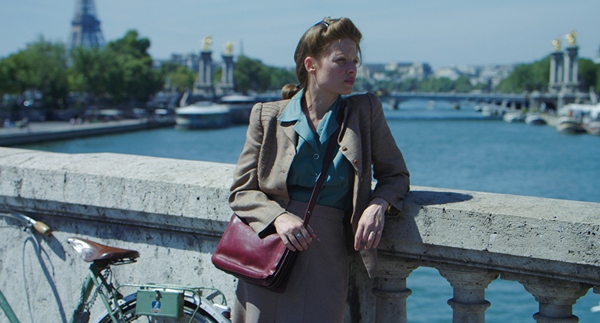![]() The liberation of Paris from the Nazis in August 1944 is a de rigueur culminating scene in almost any documentary or feature film about World War II. Memoir of War gives it a new, personalized perspective, where it serves as the background for one woman living through this fraught period.
The liberation of Paris from the Nazis in August 1944 is a de rigueur culminating scene in almost any documentary or feature film about World War II. Memoir of War gives it a new, personalized perspective, where it serves as the background for one woman living through this fraught period.
The woman is a somewhat fictionalized version of Marguerite Duras, and the screenplay is based on two semi-autobiographical stories that she claimed to have originally drafted as diary entries circa 1945, but they weren’t published until 40 years later in The War: A Memoir (La Douleur). Writer/director Emmanuel Finkiel brilliantly accomplishes its present tense anxiety by keeping the focus on Mélanie Thierry as the 30-year-old writer, wife, resistance plotter, supportive neighbor, and lover. Everyone else is a blur until they interact with her.
For most of the film, she is agonizingly waiting for her husband, Robert Antelme, who was arrested in June 1944. The Communist activist was a key figure in their resistance group led by Francois Mitterrand—code name Morland (Grégoire Leprince-Ringuet)—later president of France, 1981–1995. Desperate for news, she keeps meeting with a French agent working for the Gestapo, the oily Pierre Rabier (Benoît Magimel), with Morland’s approval to target him for possible assassination.
They rendezvous in busy cafés and restaurants full of convivial collaborators and Nazi officers, where he fawns over the famous writer and shares his postwar dream of opening a book store. She pleads ignorance to his insistent questions about her cell, while she presses him on her husband’s status. By the time he teases what jail Robert is being held, her husband and other political prisoners are being loaded up in trucks on July 1, headed to a place called Buchenwald in Germany.
For all her nervous loyalty, her voice-overs, adapted from the book’s diary-like entries, reveal her guilty ambivalence. Ever since the stillbirth of their child two years earlier, she and Robert have grown apart. As the months wear on with no information, she grows closer to his best friend and neighbor, Dionys Mascolo (Benjamin Biolay), here code-named “D.” His enveloping, reassuring hugs seem to be all that keeps her going. She is so torn that sometimes she appears as if split into two, with each image eyeing the other.
The return of those first so-called “deportees” sends her into a frenzy, and these kind of scenes have only been glimpsed in previous French films. (Finkiel drew on his parents’ experiences.) Helping to compile lists of names of the missing, she wears herself out meeting every arriving train, asking everyone if they have seen Robert.
The numbers and chaos of the returnees are overwhelming as Marguerite, and the world at large, begins to understand the different conditions people suffered as news from concentration camp liberations dribbles out. As a result, Dionys finds fellow resistance members who saw Robert transferred to Dachau, another name that begins to alarm her and the world.
The enormity of the genocide against the Jews starts to be revealed, represented by her friend Madame Katz (Shulamit Adar), who hopes for the reappearance of her deported daughter. Barely recognizable skeletons in striped uniforms arrive, and Marguerite is overwhelmed by yet another level of guilt that her suffering is being dwarfed. Every day she feverishly imagines another way Robert may have died, which would also set her free from this emotional limbo.
Antelme’s miraculous rescue is only mentioned, when Dionys amazingly secures his survival, off camera. Antelme’s ruminative 1947 memoir of his experiences was only translated into English in 1992, as The Human Race, at a time when France was finally owning up to its real history. Like her country, Marguerite can barely function as his nurse, before declaring her intent to move on with her life.
Haunted by love and war, she goes on to write screenplays, such as for Alain Resnais’s Hiroshima Mon Amour (1959), and novels, such as The Lover (1984). While she was known for her frank sexuality in her writings, Finkiel’s exposure of her unheroic feelings of paralyzing anxiety come across as more daring.







Leave A Comment